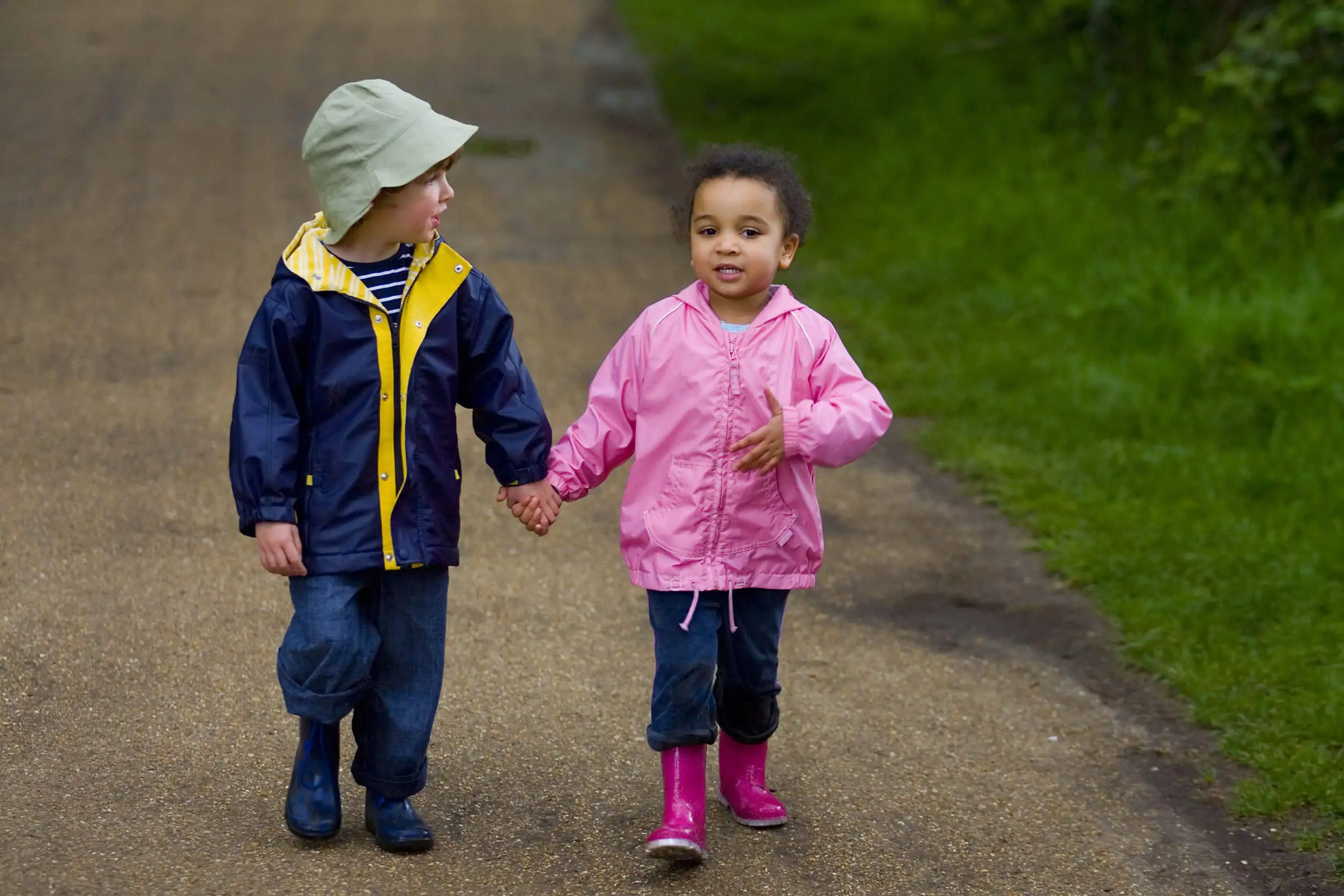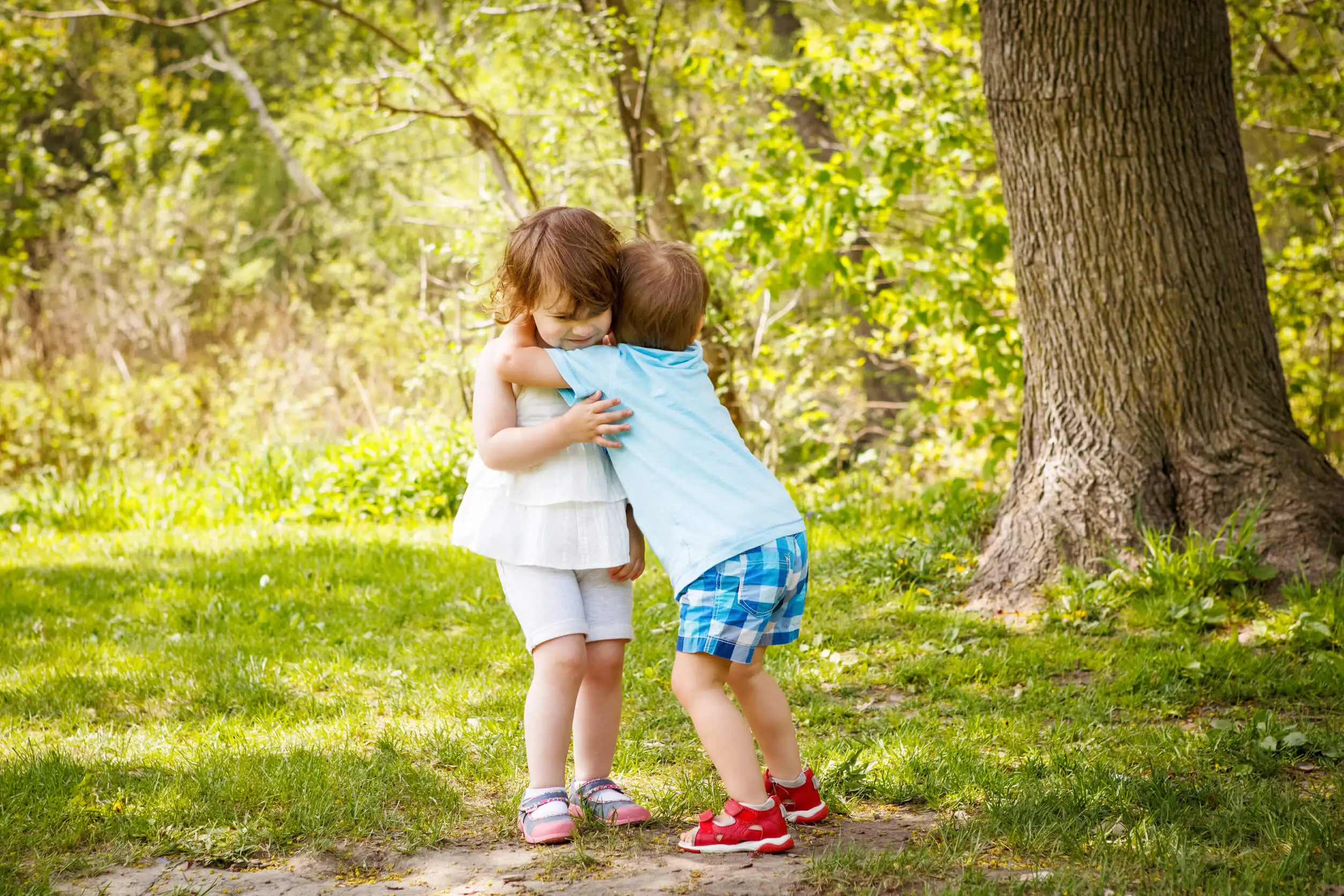Children's First Love: Why Is It Important?


Written and verified by the psychologist Elena Sanz
If you have a preschooler, he or she may come home one day claiming to have a crush on a friend or classmate. They may even tell you that they’re dating. This is a child’s first love.
This news may catch you by surprise, alarm you, or make you smile at the cuteness of the situation. However, children’s first love is more important than you might think, so it’s important to know how to act when the time comes.
In this case, we’re not referring to the first adolescent love that young people experience after puberty, but to the infantile love that four or five-year-olds claim to feel for one of their peers. This is a widespread phenomenon that most children go through. It is, in fact, a relevant milestone in their socialization process.
What is children’s first love like?

Children’s first love usually appears around four or five years of age and, generally, it’s a classmate from school, from the neighborhood, or a peer they often see. Unlike adolescents and adults, love in children has no sexual component and arises more from liking the person.
When a child enjoys spending time with a peer, playing with him or her, sharing tastes and having fun together, he or she may end up defining it as love, but in reality it’s simply someone whose company is especially pleasant for them. And usually, this love will not manifest itself beyond play, hand-holding, or an innocent kiss.
Despite this, this first love is very relevant in their socialization process; it indicates that the child is gaining social skills, learning to bond, and beginning to understand the world around them.
Where do these first loves come from?
Although it may be surprising that a child who’s so young claims to be in love or to have a “boyfriend” or “girlfriend,” this makes sense in light of the developmental stage he or she is going through. Up to this point, their social and emotional world was basically reduced to the family nucleus; however, with the beginning of schooling, that circle widens.
Thus, if the child claims to be in love, this indicates that he or she is advancing in his or her socialization process and is adding new significant people to his or her life. On the other hand, at this stage, children discover themselves as a boy or girl and begin to feel interest and curiosity for the opposite gender.
In addition, childhood is a stage of exploration and play. Through this play, children imitate adults and practice many skills. Children observe the relationship between their parents at home and look at other types of romantic bonds between their aunts, uncles, grandparents or cousins, and older siblings. In this way, they form their own idea of the couple and courtship, and can reproduce it with their peers.
Adults often even encourage this by asking the little ones if they already have a boyfriend or girlfriend, or if that special friend is their partner. In this way, children’s first loves constitute a kind of symbolic play that contributes to their learning about human relationships.
We think you may be interested in reading this, too: The Benefits of Science for Children: Curiosity and Exploration
How to deal with children’s first love?

Like this article? You may also like to read: Authoritarian Parenting Style: Characteristics and Possible Effects on Children
For children, their first love is important, and the parents’ reaction to it can have a positive or negative impact on their development. So, we offer you some recommendations to act in this regard.
Act calmly and naturally
If your young child comes to you saying that he/she is in love, stay calm and try not to be alarmed or shocked. Remember that this is a normal part of the development, and that love doesn’t have the same connotations for infants as it does for adults. Treat it naturally.
Allow and encourage emotional expression
Although you may find it funny or tender, for your child, it’s an important feeling that he or she has chosen to share with you. On the contrary, ask him or her to tell you more, and allow him or her to express how he or she feels and what he or she means by love.
Remember also that by telling you he/she has offered you a sign of trust and it’s essential not to betray it. So, don’t discuss it with others without your child’s permission, as he or she may feel humiliated or ridiculed.
Don’t interfere
With such young children, you may be tempted to intervene, either to stop it or to encourage it. Some parents will try to stop the child from saying he or she has a crush, correct the child, or even stop the child from spending time with the partner. Others may become overly involved in order to encourage the child’s courtship.
In neither case is this an appropriate attitude. It’s best to allow the child to explore, live and experiment without interfering with the development of the alleged infatuation. The role of the parents should simply be to guide and support.
Take the opportunity to discuss some important issues
This first courtship can lead to a conversation about some important issues such as consent. You can explain to your child that he/she should not force anyone to show affection, just as he/she does not have to do it if he/she does not want to.
You can also talk about the manifestations of love that correspond to each stage to clarify that certain behaviors that he/she may see in his/her parents, aunts, uncles or older siblings are not appropriate for children.
Accompany children’s first love with empathy
In short, children’s first love should not worry you, but you should not underestimate its value, either. Your task will be to accompany your child in this process (which may last only a few days) and help him/her understand and manage his/her emotions.
In conclusion, don’t laugh at your child’s confession of being in love, allow him/her to share his/her feelings with you, and support him/her if this “crush” (or the end of it) ends up affecting him/her negatively.
All cited sources were thoroughly reviewed by our team to ensure their quality, reliability, currency, and validity. The bibliography of this article was considered reliable and of academic or scientific accuracy.
- Amaya Aguirre, G. (2015). ¿ Existe el amor entre niños y niñas que tienen cuatro y cinco años de edad? (Doctoral dissertation, Universidad Autónoma de la Ciudad de México: Colegio de Ciencias y Humanidades: Licenciatura en Promoción de la Salud).
- Villalobos Guevara, A. M. (1999). Desarrollo psicosexual. Adolescencia y salud, 1(1), 73-79. Disponible en: https://www.scielo.sa.cr/scielo.php?pid=S1409-41851999000100011&script=sci_arttext
This text is provided for informational purposes only and does not replace consultation with a professional. If in doubt, consult your specialist.








